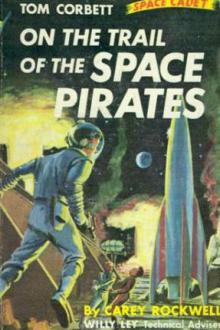Triplanetary, E. E. Smith [reading like a writer TXT] 📗

- Author: E. E. Smith
Book online «Triplanetary, E. E. Smith [reading like a writer TXT] 📗». Author E. E. Smith
“Hm … m … m. Peculiar. You two are a lot alike, at that, even though you don’t look anything like each other. … Can’t put a finger on exactly what it is, but it’s there.” Although Artomenes nor any other of his time could place it, the resemblance was indeed there. It was in and back of the eyes; it was the “look of eagles” which was long later to become associated with the wearers of Arisia’s Lens. “But here we are, and your ship’s ready. Luck, son.”
“Thanks, sir. But one more thing. If it should—if I don’t get back—will you see that my wife and the baby are … ?”
“I will, son. They will leave for North Maya tomorrow morning. They will live, whether you and I do or not. Anything else?”
“No, sir. Thanks. Goodbye.”
The ship was a tremendous flying wing. A standard commercial job. Empty—passengers, even crewmen, were never subjected to the brutal accelerations regularly used by unmanned carriers. Phryges scanned the panel. Tiny motors were pulling tapes through the controllers. Every light showed green. Everything was set. Donning a waterproof coverall, he slid through a flexible valve into his acceleration-tank and waited.
A siren yelled briefly. Black night turned blinding white as the harnessed energies of the atom were released. For five and six-tenths seconds the sharp, hard, beryllium-bronze leading edge of the back-sweeping V sliced its way through ever-thinning air.
The vessel seemed to pause momentarily; paused and bucked viciously. She shuddered and shivered, tried to tear herself into shreds and chunks; but Phryges in his tank was unconcerned. Earlier, weaker ships went to pieces against the solid-seeming wall of atmospheric incompressibility at the velocity of sound; but this one was built solidly enough, and powered to hit that wall hard enough, to go through unharmed.
The hellish vibration ceased; the fantastic violence of the drive subsided to a mere shove; Phryges knew that the vessel had leveled off at its cruising speed of two thousand miles per hour. He emerged, spilling the least possible amount of water upon the polished steel floor. He took off his coverall and stuffed it back through the valve into the tank. He mopped and polished the floor with towels, which likewise went into the tank.
He drew on a pair of soft gloves and, by manual control, jettisoned the acceleration tank and all the apparatus which had made that unloading possible. This junk would fall into the ocean; would sink; would never be found. He examined the compartment and the hatch minutely. No scratches, no scars, no mars; no telltale marks or prints of any kind. Let the Norskies search. So far, so good.
Back toward the trailing edge then, to a small escape-hatch beside which was fastened a dull black ball. The anchoring devices went out first. He gasped as the air rushed out into near-vacuum, but he had been trained to take sudden and violent fluctuations in pressure. He rolled the ball out upon the hatch, where he opened it; two hinged hemispheres, each heavily padded with molded composition resembling sponge rubber. It seemed incredible that a man as big as Phryges, especially when wearing a parachute, could be crammed into a space so small; but that lining had been molded to fit.
This ball had to be small. The ship, even though it was on a regularly-scheduled commercial flight, would be scanned intensively and continuously from the moment of entering Norheiman radar range. Since the ball would be invisible on any radar screen, no suspicion would be aroused; particularly since—as far as Atlantean Intelligence had been able to discover—the Norheimans had not yet succeeded in perfecting any device by the use of which a living man could bail out of a supersonic plane.
Phryges waited—and waited—until the second hand of his watch marked the arrival of zero time. He curled up into one half of the ball; the other half closed over him and locked. The hatch opened. Ball and closely-prisoned man plummeted downward; slowing abruptly, with a horrible deceleration, to terminal velocity. Had the air been any trifle thicker the Atlantean captain would have died then and there; but that, too, had been computed accurately and Phryges lived.
And as the ball bulleted downward on a screaming slant, it shrank!
This, too, the Atlanteans hoped, was new—a synthetic which air-friction would erode away, molecule by molecule, so rapidly that no perceptible fragment of it would reach ground.
The casing disappeared, and the yielding porous lining. And Phryges, still at an altitude of over thirty thousand feet, kicked away the remaining fragments of his cocoon and, by judicious planning, turned himself so that he could see the ground, now dimly visible in the first dull gray of dawn. There was the highway, paralleling his line of flight; he wouldn’t miss it more than a hundred yards.
He fought down an almost overwhelming urge to pull his ripcord too soon. He had to wait—wait until the last possible second—because parachutes were big and Norheiman radar practically swept the ground.
Low enough at last, he pulled the ring. Z-r-r-e-e-k—whap! The chute banged open; his harness tightened with a savage jerk, mere seconds before his hard-sprung knees took the shock of landing.
That was close—too close! He was white and shaking, but unhurt, as he gathered in the billowing, fighting sheet and rolled it, together with his harness, into a wad. He broke open a tiny ampoule, and as the drops of liquid touched it the stout fabric began to disappear. It did not burn; it simply disintegrated and vanished. In less than a minute there remained only a few steel snaps and rings, which the Atlantean buried under a meticulously-replaced circle of sod.
He was still on schedule. In less than three minutes the signals would be on the air and he would know where he was—unless the Norsks had succeeded in finding and eliminating the whole Atlantean undercover group. He pressed a stud on a small instrument; held it down. A line burned green across the dial—flared red—vanished.
“Damn!” he





Comments (0)